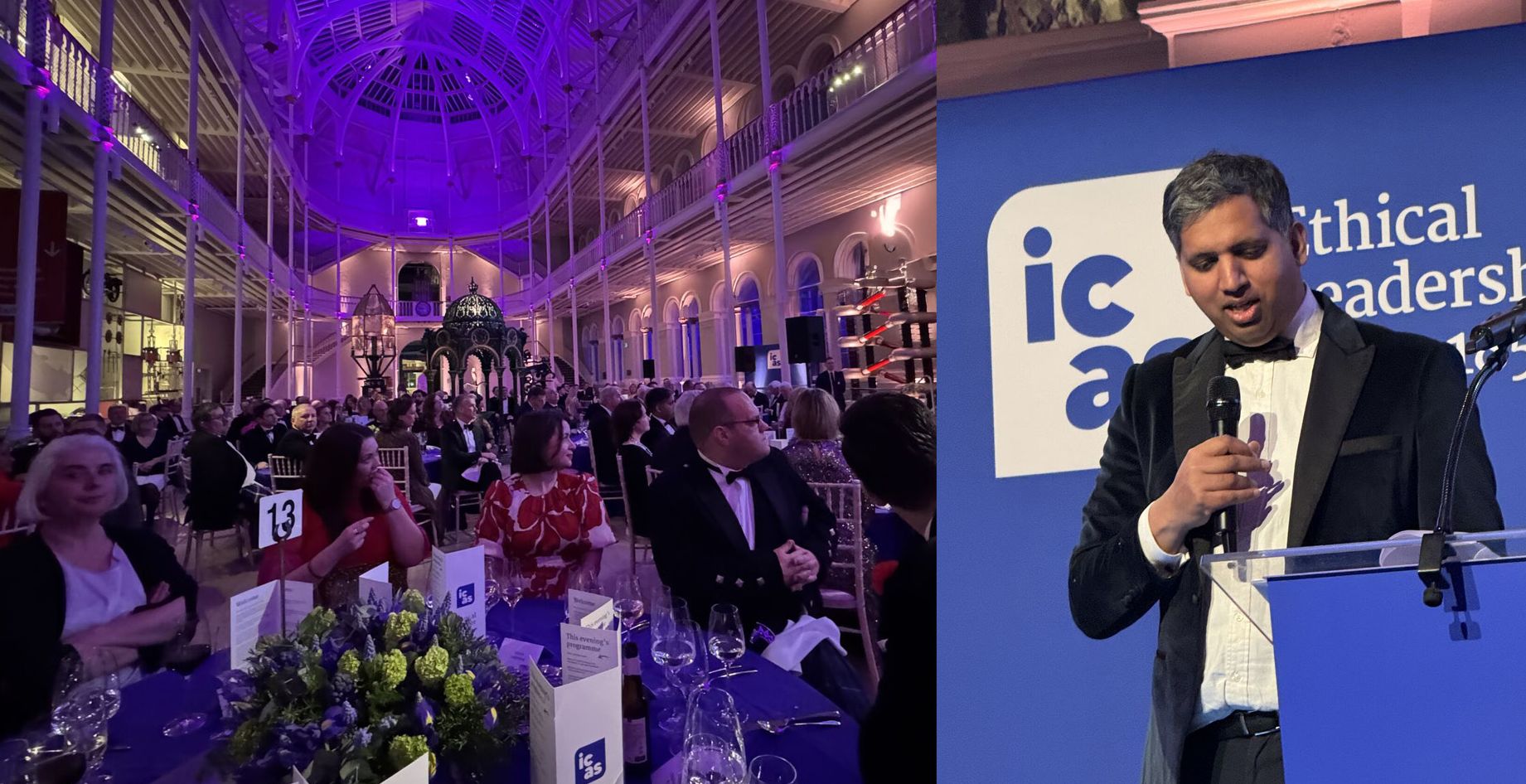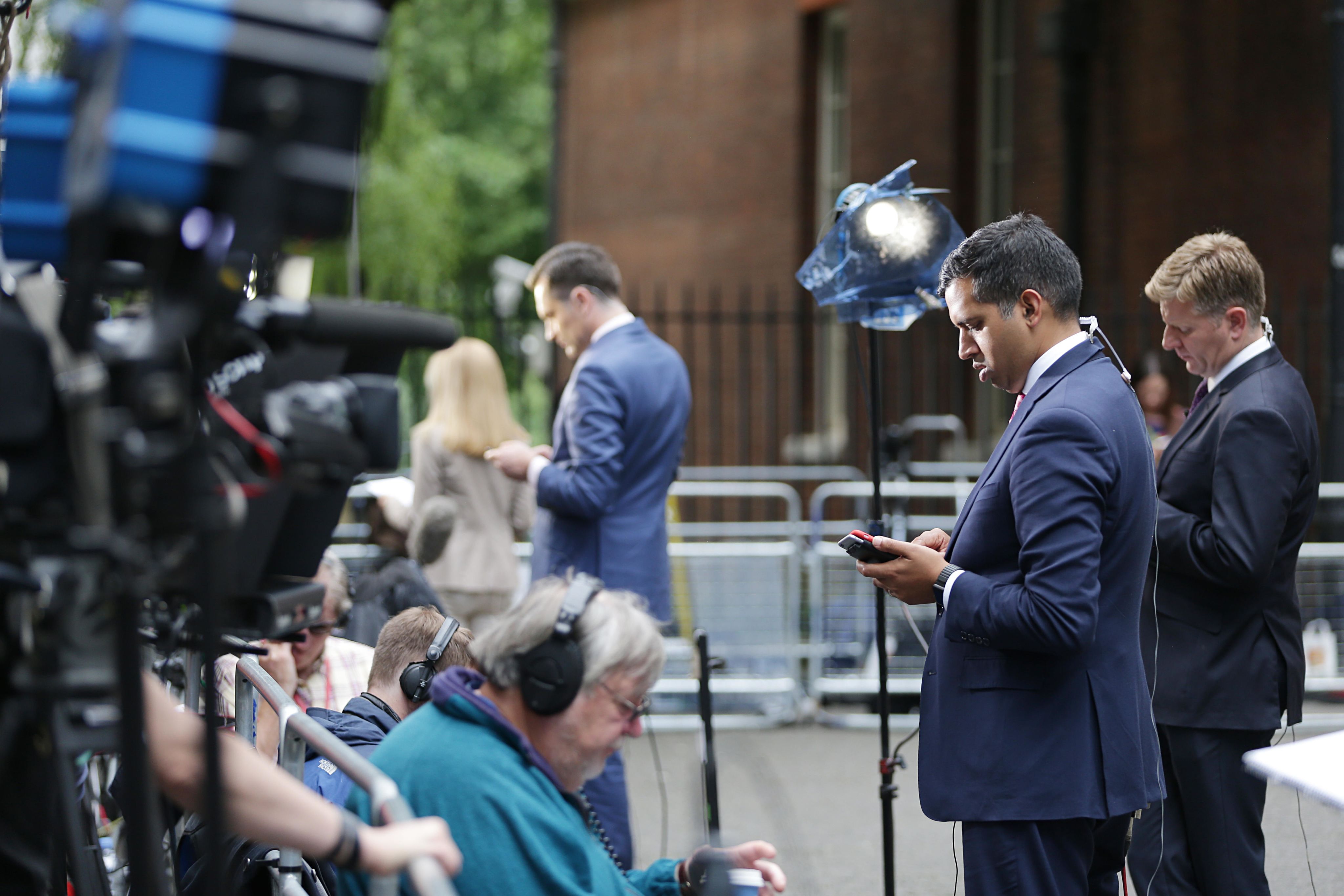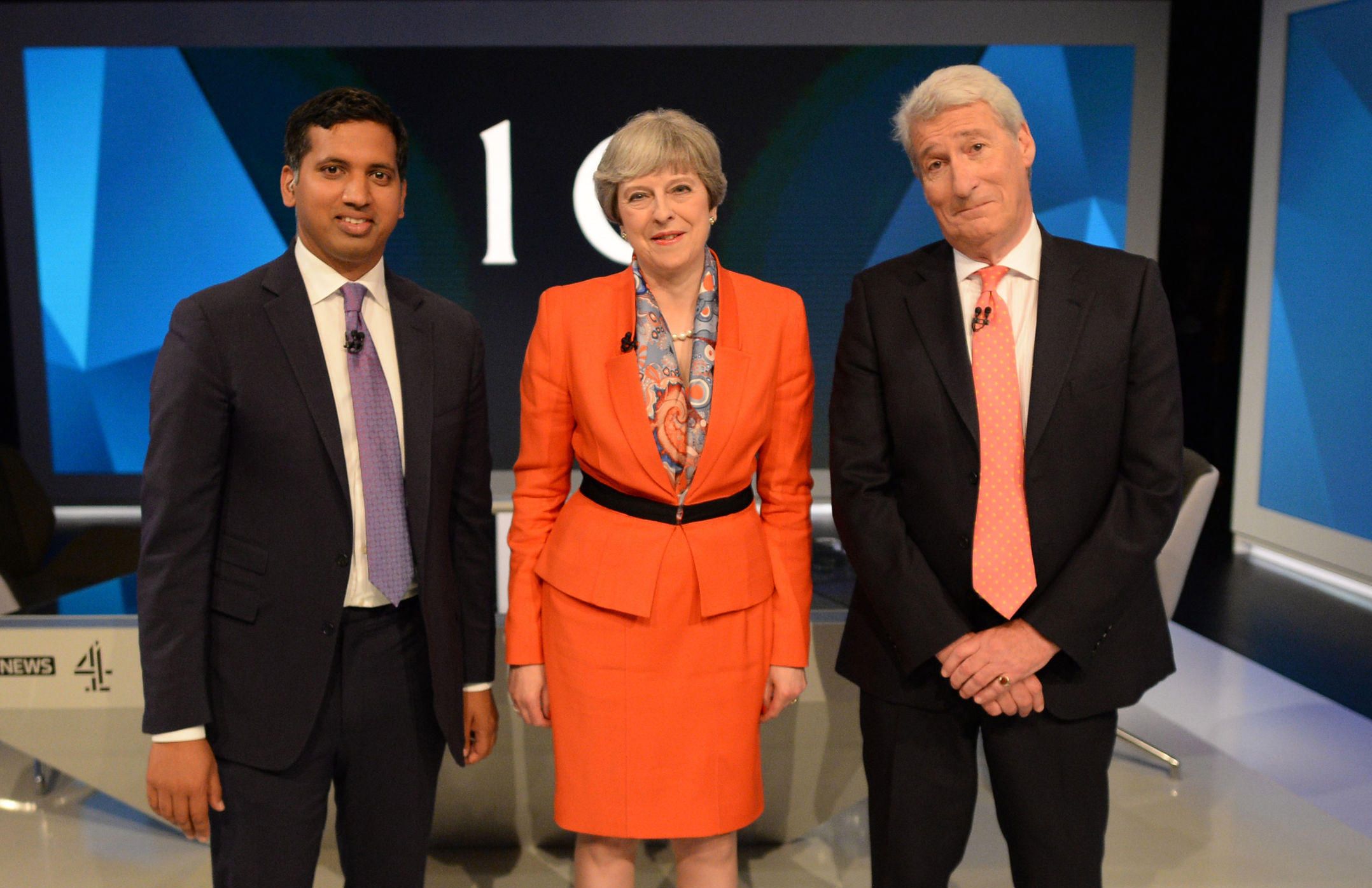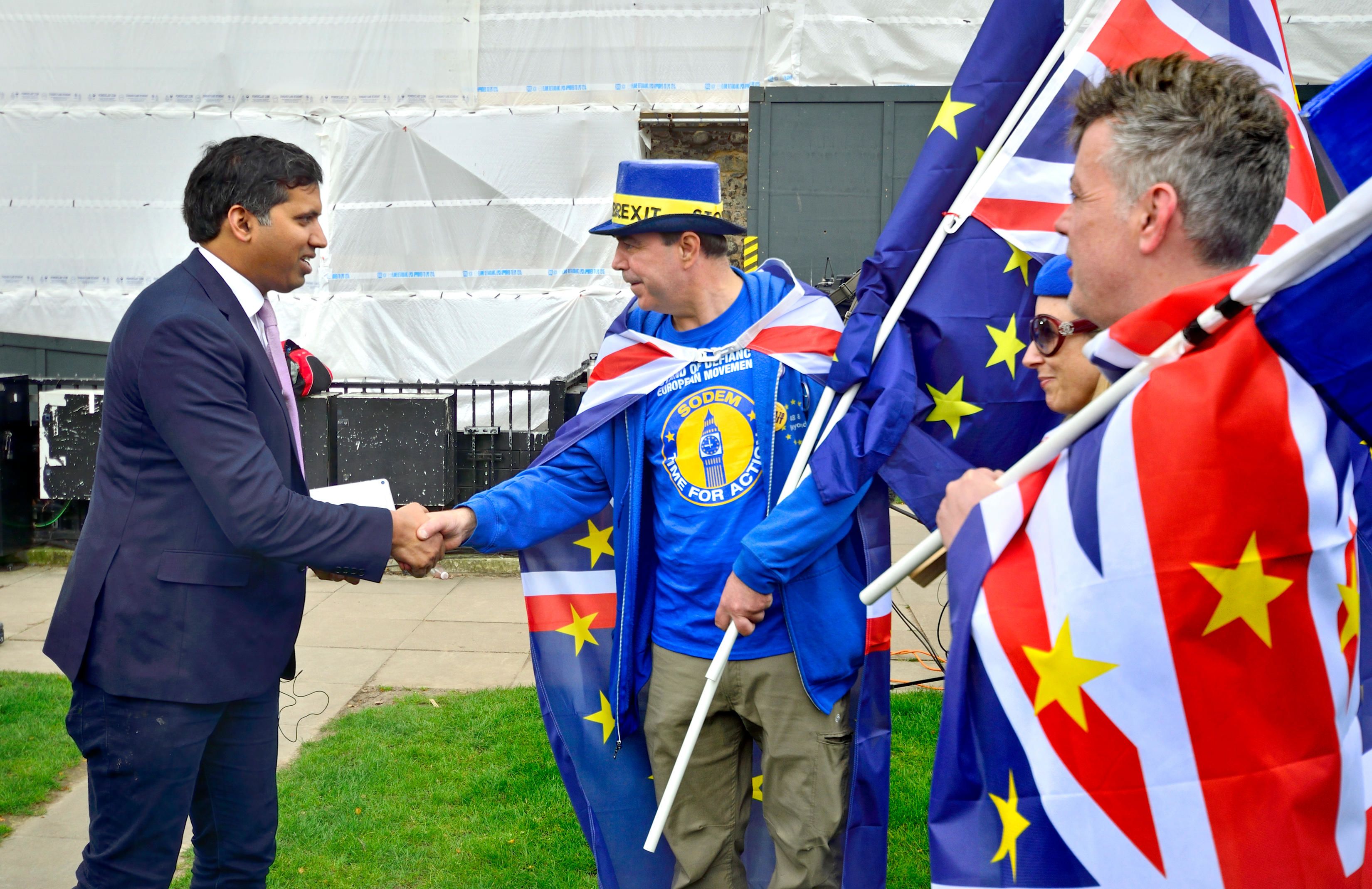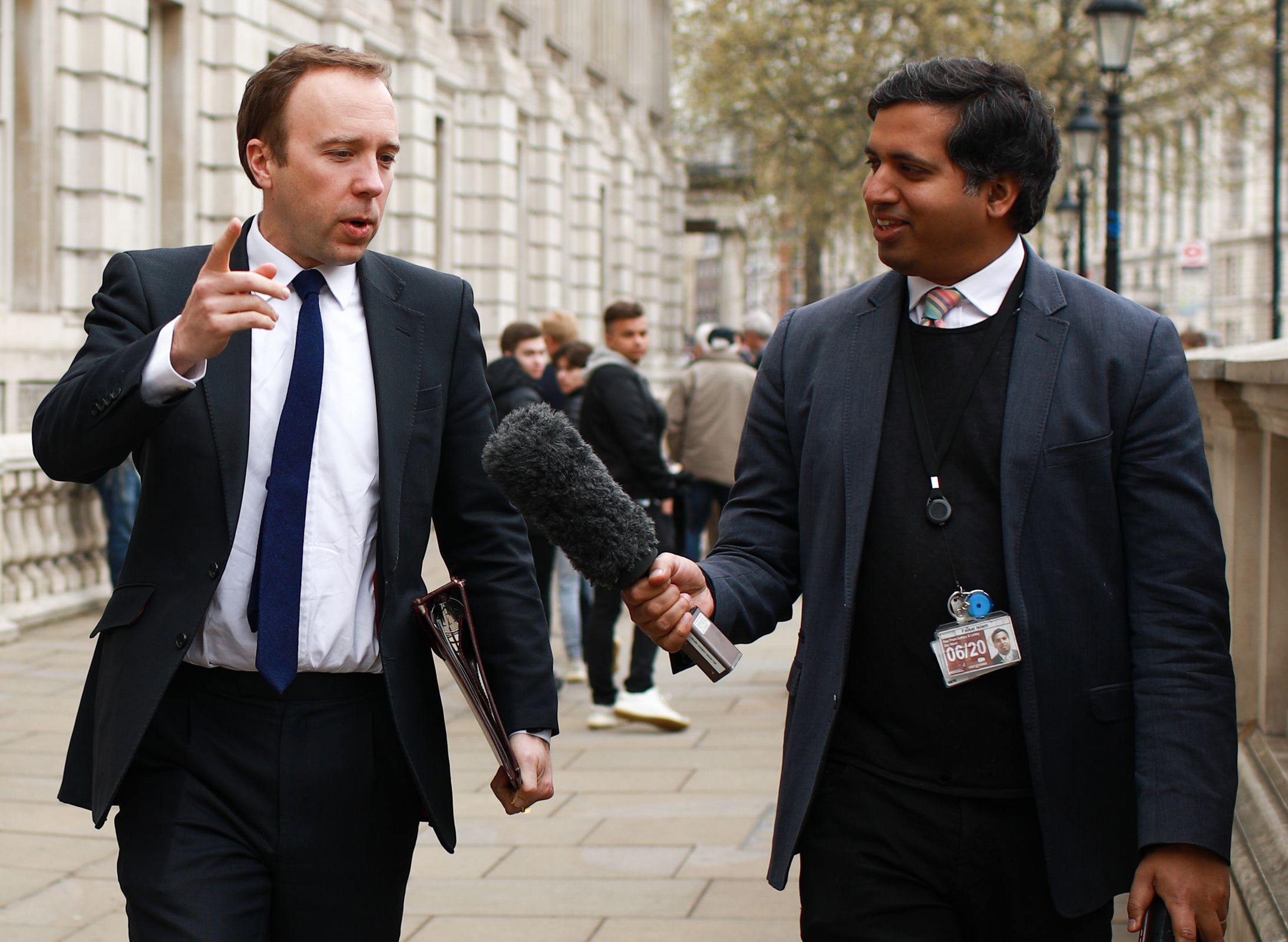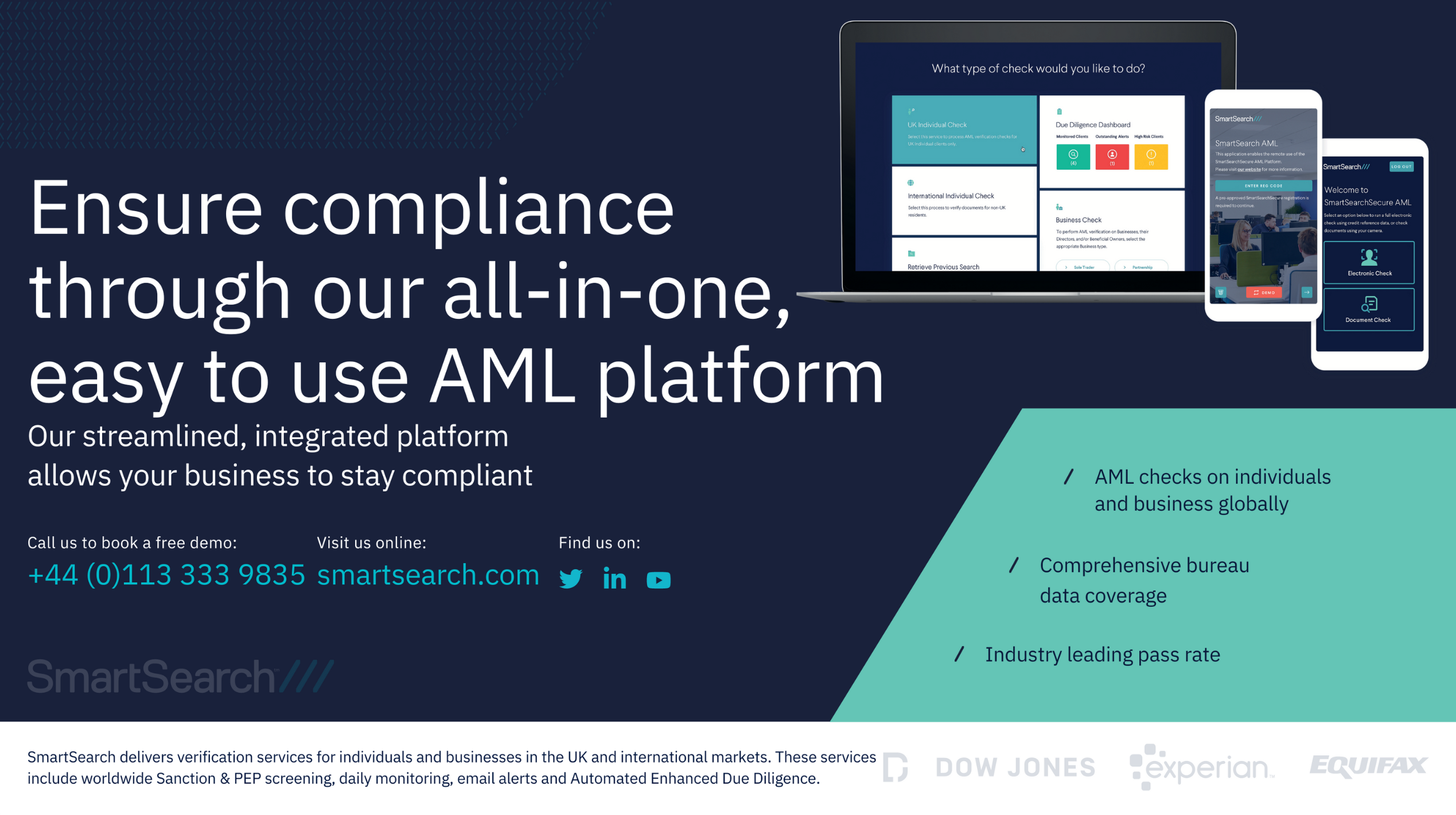‘Economics lets you see around corners’
Faisal Islam, the BBC’s Economics Editor, has been ringside during two decades of extraordinary financial and political turbulence. The son of an accountant talks tariffs, tech, talent and Eurovision (seriously!) with Ryan Herman
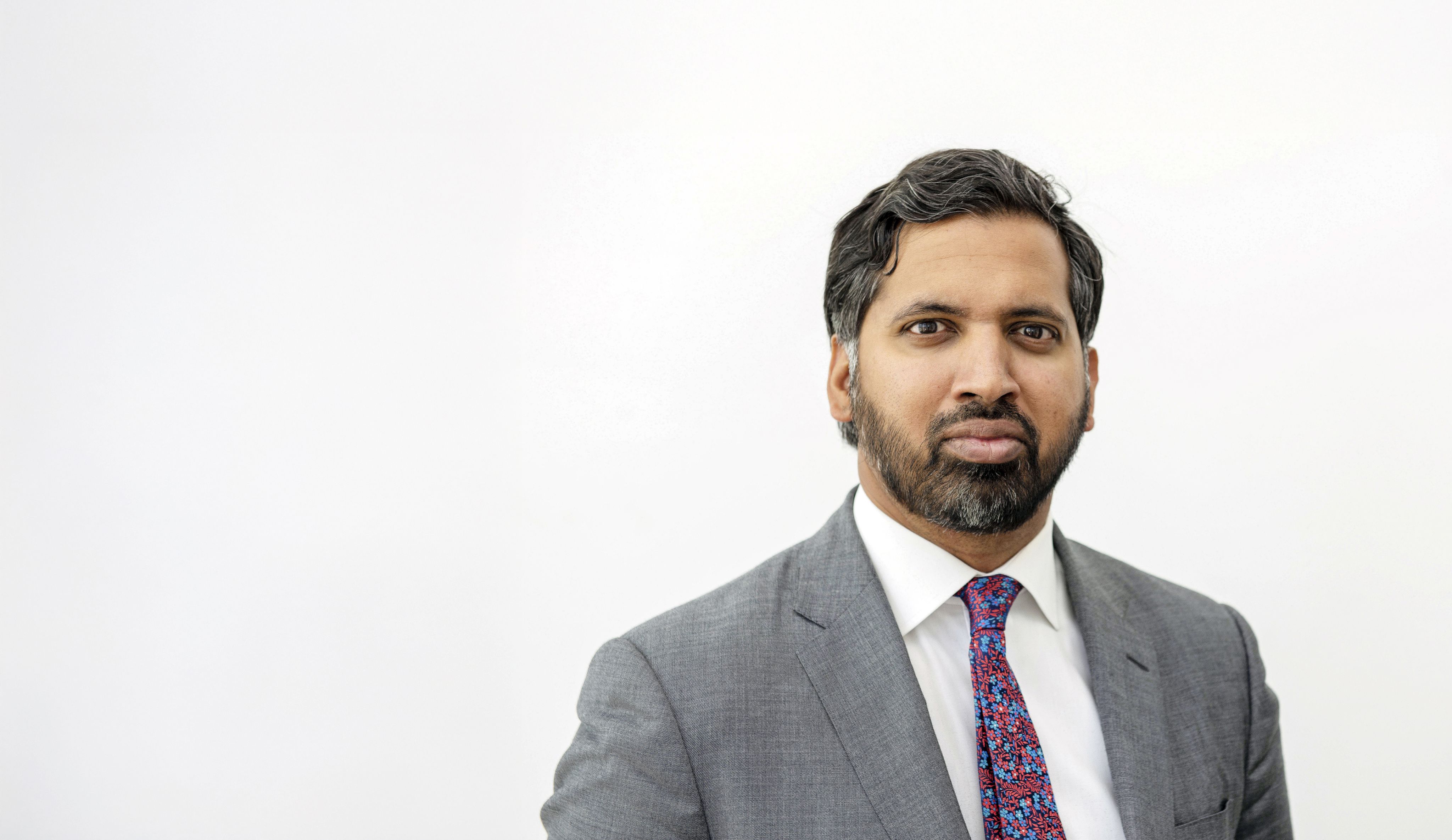
‘Economics lets you see around corners’

Faisal Islam, the BBC’s Economics Editor, has been ringside during two decades of extraordinary financial and political turbulence. The son of an accountant talks tariffs, tech, talent and Eurovision (seriously!) with Ryan Herman
Faisal Islam is addressing a room full of CAs. He is the guest speaker at the ICAS Annual Dinner in March, and among his many eye-opening stories is a 2012 trip to Russia to meet the heads of Gazprom. “Friendly chaps!” says the BBC’s Economics Editor jokingly, although at the time it was no laughing matter.
A younger Vladimir Putin wrote his PhD thesis on the importance of Russian energy exports in furthering the country’s geopolitical ambitions, and the men from Gazprom were wondering if the UK would be willing to sell British Gas and secure its national gas supply from Russia instead.
In the end, it was Germany that struck a deal with the Russian giant, effectively handing control of much of its gas infrastructure, including storage units, to the company and, ultimately, to Vladimir Putin. It was a spectacularly bad decision. “The very mechanism designed to protect energy security was literally handed to the biggest threat to energy security,” says Islam.
During his speech, Islam casts himself in the role of a Forrest Gump-type character – someone who somehow finds himself thrust into historic events such as the 2008 financial crisis and the collapse of RBS, Brexit, multiple elections, multiple leadership battles, the pandemic, trade wars and more. If not always “in the room where it happened”, he was at least outside, armed with some questions, a camera crew and a direct line into millions of UK households.
Yet, had Islam’s father had his way, his son might well have been a member of the audience that day at the National Museum of Scotland, rather than the headline act.
“The key driver for growth is obviously human capital and skills, and to connect back up with the opportunity of the new geopolitics. We’ve got amazing universities, we’ve got amazing research, frontier pharma, frontier AI”
Islam Sr trained to become an accountant in India before emigrating to the UK and he wanted his sons to follow the same path. His father was so passionate about the profession that after moving to Manchester he made it his mission to track down William Pickles, the author of Accountancy, the key textbook he had studied while training.
Islam’s father secured a job with a Mancunian accountant, with whom the family remain close. He delivered a eulogy at Islam Sr’s funeral in 2020. And Islam himself is now godfather to his granddaughter.
But Islam chose journalism over accountancy and has spent most of his career covering business and economics, except for a five-year stint as Political Editor at Sky News. “There’s a slightly more wholesome relationship with people if you’re talking about economics than when you’re talking politics,” he says.
“I genuinely love covering economics, and I think it’s the best way to explain what is happening in the world. You get an eye for things happening in five to ten years, you see around corners better. Ahead of the US elections, I was saying it’s all about tariffs.”
He later discusses one theory behind Trump’s tariff war: that it is an intentional effort to weaken the dollar in a bid to boost exports.
Ducking and diving
Speaking to Islam before the event in an otherwise empty auditorium at the National Museum of Scotland, we ask: where does the UK fit into this complex picture of global trade and finance?
“There is a route through this where we slightly duck and dive and crystallise a bit of a middle ground – trade a bit with the US, trade a bit with the EU, maintain links with China – and that’s potentially quite compelling,” he says.
“It fits with our comparative advantage over the years. But it will take very nimble policy from our government, possibly different from what they thought six months ago. I think that’s what they would love, but we may find ourselves pulled in both directions, trying to sit on a rickety fence and being buried under it.”
Similarly, it is a balancing act for the government to stimulate growth while maintaining its vision for UK energy and increasing the production of renewables.
“Maybe because the low-hanging fruit has been picked in terms of the changes needed in the economy for net zero, we’re now in a situation where a lot of climate campaigners think it’s obvious we should now take the next few steps, which might involve changes to people’s lifestyles,” says Islam.
“But it’s difficult to argue that it’s not a deeply political judgment – the extent to which people want to change their lifestyles for the good of future generations, and for people in other parts of the world who are going to be hit first by climate change.
“However, we’re finding you can’t just assert that this is an emergency. The case has to be made. I think what you’ll see, though, is the UK will carry on with it, companies will carry on with it. Many of their customers are still very concerned about this, and there’s a transition happening anyway. But there has been a sort of slowing down of urgency in the corporate world, clearly, and that may be the direction of pressure for the next year or two.”
The ICAS Annual Dinner
The ICAS Annual Dinner
And if matters weren’t complicated enough, then what is potentially our greatest opportunity for growth could also be the cause of a crisis.
“The key driver for growth is obviously human capital and skills, and to connect back up with the opportunity of the new geopolitics,” says Islam.
“We’ve got amazing universities, we’ve got amazing research, frontier pharma, frontier AI. At the [Google] DeepMind campus in King’s Cross, they’ve cleared something like a billion years of PhD time in three months, potentially reinventing every branch of science. You’ve got to throw the book at these things. I think most governments recognise this, but throwing the book might just mean a lot more than we thought about in the past.”
Time would appear to be of the essence. We are already seeing the consequences of AI, even if opinions are divided about how good or reliable it is.
Shortly after we speak, CEO Bruce Cartwright CA delivers a speech that includes a poem about the institute written by AI, which turns out to be much better than might have been expected.
We may well look back on 2025 and remember the release of the Chinese AI tool DeepSeek as one of its pivotal moments. In June 2023, OpenAI boss Sam Altman proudly claimed, “It’s totally hopeless to compete with us.” Then China came along and did just that – and at a fraction of the cost, although the exact figures are disputed.
Faisal Islam is addressing a room full of CAs. He is the guest speaker at the ICAS Annual Dinner in March, and among his many eye-opening stories is a 2012 trip to Russia to meet the heads of Gazprom. “Friendly chaps!” says the BBC’s Economics Editor jokingly, although at the time it was no laughing matter.
A younger Vladimir Putin wrote his PhD thesis on the importance of Russian energy exports in furthering the country’s geopolitical ambitions, and the men from Gazprom were wondering if the UK would be willing to sell British Gas and secure its national gas supply from Russia instead.
In the end, it was Germany that struck a deal with the Russian giant, effectively handing control of much of its gas infrastructure, including storage units, to the company and, ultimately, to Vladimir Putin. It was a spectacularly bad decision. “The very mechanism designed to protect energy security was literally handed to the biggest threat to energy security,” says Islam.
During his speech, Islam casts himself in the role of a Forrest Gump-type character – someone who somehow finds himself thrust into historic events such as the 2008 financial crisis and the collapse of RBS, Brexit, multiple elections, multiple leadership battles, the pandemic, trade wars and more. If not always “in the room where it happened”, he was at least outside, armed with some questions, a camera crew and a direct line into millions of UK households.
Yet, had Islam’s father had his way, his son might well have been a member of the audience that day at the National Museum of Scotland, rather than the headline act.
“The key driver for growth is obviously human capital and skills, and to connect back up with the opportunity of the new geopolitics. We’ve got amazing universities, we’ve got amazing research, frontier pharma, frontier AI”
Islam Sr trained to become an accountant in India before emigrating to the UK and he wanted his sons to follow the same path. His father was so passionate about the profession that after moving to Manchester he made it his mission to track down William Pickles, the author of Accountancy, the key textbook he had studied while training.
Islam’s father secured a job with a Mancunian accountant, with whom the family remain close. He delivered a eulogy at Islam Sr’s funeral in 2020. And Islam himself is now godfather to his granddaughter.
But Islam chose journalism over accountancy and has spent most of his career covering business and economics, except for a five-year stint as Political Editor at Sky News. “There’s a slightly more wholesome relationship with people if you’re talking about economics than when you’re talking politics,” he says.
“I genuinely love covering economics, and I think it’s the best way to explain what is happening in the world. You get an eye for things happening in five to ten years, you see around corners better. Ahead of the US elections, I was saying it’s all about tariffs.” He later discusses one theory behind Trump’s tariff war: that it is an intentional effort to weaken the dollar in a bid to boost exports.
Ducking and diving
Speaking to Islam before the event in an otherwise empty auditorium at the National Museum of Scotland, we ask: where does the UK fit into this complex picture of global trade and finance?
“There is a route through this where we slightly duck and dive and crystallise a bit of a middle ground – trade a bit with the US, trade a bit with the EU, maintain links with China – and that’s potentially quite compelling,” he says.
“It fits with our comparative advantage over the years. But it will take very nimble policy from our government, possibly different from what they thought six months ago. I think that’s what they would love, but we may find ourselves pulled in both directions, trying to sit on a rickety fence and being buried under it.”
Similarly, it is a balancing act for the government to stimulate growth while maintaining its vision for UK energy and increasing the production of renewables.
“Maybe because the low-hanging fruit has been picked in terms of the changes needed in the economy for net zero, we’re now in a situation where a lot of climate campaigners think it’s obvious we should now take the next few steps, which might involve changes to people’s lifestyles,” says Islam.
“But it’s difficult to argue that it’s not a deeply political judgment – the extent to which people want to change their lifestyles for the good of future generations, and for people in other parts of the world who are going to be hit first by climate change.
“However, we’re finding you can’t just assert that this is an emergency. The case has to be made. I think what you’ll see, though, is the UK will carry on with it, companies will carry on with it. Many of their customers are still very concerned about this, and there’s a transition happening anyway. But there has been a sort of slowing down of urgency in the corporate world, clearly, and that may be the direction of pressure for the next year or two.”
The ICAS Annual Dinner
The ICAS Annual Dinner
And if matters weren’t complicated enough, then what is potentially our greatest opportunity for growth could also be the cause of a crisis.
“The key driver for growth is obviously human capital and skills, and to connect back up with the opportunity of the new geopolitics,” says Islam.
“We’ve got amazing universities, we’ve got amazing research, frontier pharma, frontier AI. At the [Google] DeepMind campus in King’s Cross, they’ve cleared something like a billion years of PhD time in three months, potentially reinventing every branch of science. You’ve got to throw the book at these things. I think most governments recognise this, but throwing the book might just mean a lot more than we thought about in the past.”
Time would appear to be of the essence. We are already seeing the consequences of AI, even if opinions are divided about how good or reliable it is.
Shortly after we speak, CEO Bruce Cartwright CA delivers a speech that includes a poem about the institute written by AI, which turns out to be much better than might have been expected.
We may well look back on 2025 and remember the release of the Chinese AI tool DeepSeek as a pivotal moment. In June 2023, OpenAI boss Sam Altman proudly claimed, “It’s totally hopeless to compete with us.” Then China came along and did just that – and at a fraction of the cost, although the exact figures are disputed.
Islam and other journalists check the breaking news
Islam and other journalists check the breaking news
Islam with Labour leader Jeremy Corbyn during a 2017 election debate
Islam with Labour leader Jeremy Corbyn during a 2017 election debate
Islam, Prime Minister Theresa May and Jeremy Paxman
Islam, Prime Minister Theresa May and Jeremy Paxman
Shaking hands with anti-Brexit campaigner, Steve Bray
Shaking hands with anti-Brexit campaigner, Steve Bray
Interviewing Matt Hancock
Interviewing
During his speech, Islam leaves the audience in no doubt about China’s rapid and ongoing ascent. Before the pandemic, the country was exporting barely one million cars a year; its 2025 projection is for 6.2 million. BYD, its leading electric carmaker, now claims its vehicles can be fully charged in five minutes.
Again, it’s another difficult balancing act for the UK. “There’s a window for the UK; it’s the G7 economy with great tech that is connected to the rest of the world without being too connected. You can see that working. But I think if you believe in it, it’s a set of priorities. You’ve got to shout about it with a megaphone.”
Islam’s main concern, though, is closer to home and that AI is replacing some of the entry level jobs that students and apprencticeships would expect to fill. “I’m really worried about the number of young people disconnected from the labour force, the rise of mental health issues, and people going straight from education into the benefits system. I cover it journalistically, but you can’t help but have this feeling in the pit of your stomach. This should not be happening. It’s a waste – a waste for the economy, for the taxpayer, but most of all, for the individuals.”
Islam asserts that sometimes the UK itself would benefit from an audit – looking back to find out what went wrong and how a different approach might have yielded a better outcome. “Was this presumption right? Did we get that wrong? How do we learn? That is the scientific method. That’s how you get growth and wisdom,” he says.
And sometimes, the numbers can be wrong, even when everyone thinks they are right. To illustrate the point, Islam recalls visiting Oldrich Vasicek, a mathematician who defected from Czechoslovakia to the US in 1968. He created the Vasicek model, which every bank has used to underwrite its capital reserves, and made enough money to retire and become a windsurfing Californian hippy.
“He didn’t know that his equation had been used by every single bank in the world. When I showed it to him, he said, ‘It’s wrong!’”
While economics remains Islam’s main beat, he has added occasional presenter duties on Newsnight to his CV. And it’s in this capacity that he’s enjoying his least expected brush with fame.
When this year’s Maltese Eurovision entry risked disqualification for its suggestive lyrics, he interviewed the singer, Miriana Conte, and playfully suggested she amend the offending line to ”serving brunch, maybe”. Conte duly sampled his words and re-edited the now cleaned-up track to include his voice – which he now hopes will secure him a ticket to the big night itself in Basel: “I’m just waiting for the call to perform in May, because obviously every lyric has to be sung live, yes?”
If anyone knows what’s just around the corner, it should be the economist.
Read our 2023 interview with BBC News presenter, Clive Myrie
During his speech, Islam leaves the audience in no doubt about China’s rapid and ongoing ascent. Before the pandemic, the country was exporting barely one million cars a year; its 2025 projection is for 6.2 million. BYD, its leading electric carmaker, now claims its vehicles can be fully charged in five minutes.
Again, it’s another difficult balancing act for the UK. “There’s a window for the UK; it’s the G7 economy with great tech that is connected to the rest of the world without being too connected. You can see that working. But I think if you believe in it, it’s a set of priorities. You’ve got to shout about it with a megaphone.”
Islam’s main concern, though, is closer to home. “I’m really worried about the number of young people disconnected from the labour force, the rise of mental health issues, and people going straight from education into the benefits system. I cover it journalistically, but you can’t help but have this feeling in the pit of your stomach. This should not be happening. It’s a waste – a waste for the economy, for the taxpayer, but most of all, for the individuals.”
Islam asserts that sometimes the UK itself would benefit from an audit – looking back to find out what went wrong and how a different approach might have yielded a better outcome. “Was this presumption right? Did we get that wrong? How do we learn? That is the scientific method. That’s how you get growth and wisdom,” he says.
And sometimes, the numbers can be wrong, even when everyone thinks they are right. To illustrate the point, Islam recalls visiting Oldrich Vasicek, a mathematician who defected from Czechoslovakia to the US in 1968. He created the Vasicek model, which every bank has used to underwrite its capital reserves, and made enough money to retire and become a windsurfing Californian hippy.
“He didn’t know that his equation had been used by every single bank in the world. When I showed it to him, he said, ‘It’s wrong!’”
While economics remains Islam’s main beat, he has added occasional presenter duties on Newsnight to his CV. And it’s in this capacity that he’s enjoying his least expected brush with fame.
When this year’s Maltese Eurovision entry risked disqualification for its suggestive lyrics, he interviewed the singer, Miriana Conte, and playfully suggested she amend the offending line to ”serving brunch, maybe”. Conte duly sampled his words and re-edited the now cleaned-up track to include his voice – which he now hopes will secure him a ticket to the big night itself in Basel: “I’m just waiting for the call to perform in May, because obviously every lyric has to be sung live, yes?”
If anyone knows what’s just around the corner, it should be the economist.
Read our 2023 interview with BBC News presenter, Clive Myrie



